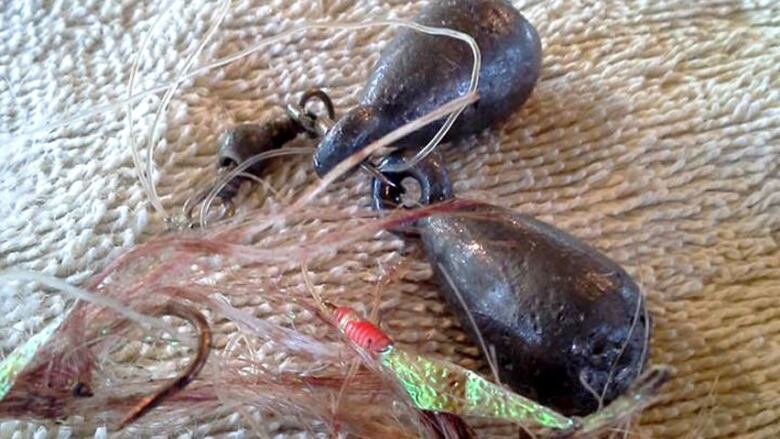Gun group clashing with Ottawa over effort to eliminate lead from ammunition
Studies link lead contamination in environment to discarded bullets, sinkers, jigs

A leading organization representing Canadian gun owners is upin arms about a renewed effort by the federal government to get the lead out of ammunition.
"The only purpose of this is to set up more anti-gun obstacles," Tony Bernardo, head of the Canadian Shooting Sports Association, said in an interview. "That's what it's designed to do."
Environment and Climate Change Canada recently released two studies forecasting the amount of lead from ammunition, fishing sinkers and jigsit expects will be released into the water and land over the next decade.
"Most lead used in ammunition is lost to the environment," says one of the two reports, commissioned from Toxecology- Environmental Consulting Ltd.
"The popularity of shooting sports has grown over the past 5 years and this trend is expected to continue, hence increased uses and releases of lead via ammunition are expected over the next 10 years."

The study projects that the amount of lead released annually into the environment from ammunition will rise to about 5,800 tonnes in 2025, from about 5,000 tonnes in 2016.
But the consultants could only offer estimates based onpublicly-available data because, says the study,"most stakeholders, including ammunition manufacturers, importers, distributors and retailers, refused to provide data for the study."
The report suggests the government invoke Section 71 of the Canadian Environmental Protection Act, which would force stakeholders to surrender their data on lead ammunition production, imports and sales.
'Resistant to change'
The authors also warned that gun owners will oppose any move to replace the lead in ammunition with other metals, such as steel.
"Many end users of ammunition are very resistant to change, refuse to discuss the science regarding the toxicity of lead ammunition, deny there is a problem, continue to argue that the alternatives don't work despite evidence to the contrary," says the report.
"And [they] have indicated that any discussion on lead in ammunition is an unfair attack on their sport and gun ownership in general."

The second study, also by Toxecology, estimates that the environment absorbs about 460 tonnes of lead each year from sinkers and jigs lost by anglers and others. That level is expected to remain steady for the next decade.
Since the 1990s, the use of lead ammunition by hunters shooting migratory waterfowlhas been banned. But several previous attempts by the federal government to eliminate the highly toxic metal from all ammunition have foundered, largely because of opposition from gun owners.
Junk science- Tony Bernardo, head of the Canadian Shooting Sports Association, describing a federal government report on lead in ammunition.
Both Toxecology reports were commissioned in 2016 to update government estimates of the amount oflead entering the environment from hunting and fishing. Previous estimates made in the early 1990s are now outdated.
The ammunition report cost $71,459. The report onfishing gear cost $58,304.
The research "is the first step in understanding the barriers to the use of lead-free alternatives," said Mark Johnson, spokesman for Environment and Climate Change Canada.
"We will draw on the studies' findings, along with feedback received from stakeholders, including provinces, territories and Indigenous groups, to develop an approach to encourage lead-free ammunition and sinkers and jigs in Canada."
The department recently sent out emails and letters to more than 1,500 stakeholders, including hunters and anglers, asking for feedback by June 1.
Bernardo said his group will not co-operate with the effort, calling the reports' findings "junk science" and claimingthe government's real goal is "to discourage shooters."
"They asked us to distribute it to our clubs, which we declined to do," he said. The CSSA has about 32,000 members.
Banned in Denmark
Gun groups have argued that metals proposed as replacements for lead are more expensive andnot as effective. They arguethat hunting releases amounts of lead too small to taint the environment, that many shooting ranges have mitigation measuresand that there's not enough science behind the claim that wildlife is being harmed by ingesting the lead.
The department counters those claims, arguing in a recent web posting that "recreational shooting and other game hunting remain a significant cause of lead releases."
"Game meat containing lead ammunition fragments and consumed by children could have an impact on their intelligence and development," the posting warns. "Protect your family and wildlife by choosing and promoting the use of [lead-free] alternatives."
Denmark, the Netherlands and Sweden have all banned lead ammunition; California is in the process of doing so. Some jurisdictions alsohave curbed the use of lead in fishing gear.
Over many years, the Canadian government has phased out lead in gasoline, paints and food cans. Levels of lead found in the air and in blood samples subsequently dropped significantly.
In March, the Liberal government tabled long-promised gun-control legislation Bill C-71 which has been opposed by gun groups.
Follow @DeanBeebyon Twitter












_(720p).jpg)


 OFFICIAL HD MUSIC VIDEO.jpg)
.jpg)



























































































